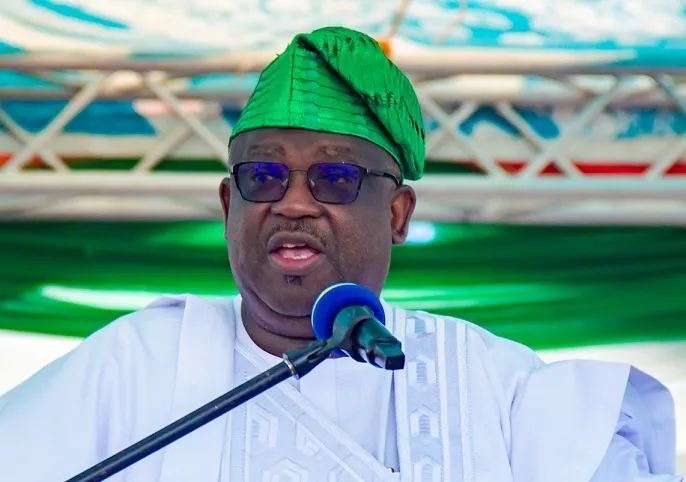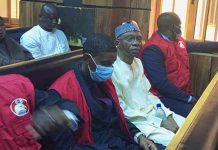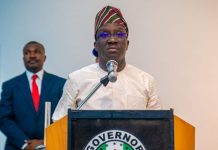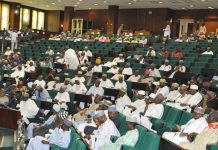Caleb Mutfwang of the Peoples Democratic Party (PDP) was fired as governor of Plateau state on Sunday by the Court of Appeal, which was convening in Abuja. Nentawe Goshwe of the All Progressives Congress (APC) was declared the winner of the March 18 governorship election by the Independent National Electoral Commission (INEC).
In her lead opinion, Justice Elfrieda Williams-Dawodu, who presided over a three-person panel of appeal court justices, invoked Section 177 of the Constitution to support her claim that the PDP had no right to sponsor Manasseh for governor.
The panel determined that the party’s attempt to hold a legitimate congress in only five of the state’s seventeen local government districts was a violation of the court order, rendering the congress void.
Contrary to the tribunal’s conclusions—which held that the appellant lacked the legal right to challenge the respondent’s validity—the court dismissed the Plateau State Governorship Election Petition Tribunal’s ruling and held that the qualification issue is both a pre-election and a post-election matter.
The court further pointed out that a political party’s exclusive right to support a candidate after fulfilling the prerequisites is stipulated in Section 134 of the Electoral Act.
The court directed INEC to obtain the certificate of return given to Governor Mutfwang and provide a new certificate of return to Goshwe, invoking Section 136 of the Electoral Act.
The state’s governorship race was declared won by Mutfwang by INEC on March 18 after he received 525,299 votes, defeating 17 other contenders, including Goshwe, who received 481,370.
Goshwe filed a challenge against Mutfwang’s election with the tribunal, arguing that the governor was not duly nominated and endorsed by his political party (PDP), and that the PDP lacked the necessary organizational framework to support a candidate in the governorship race.
In addition, he claimed that Mutfwang’s election was not held in accordance with the Electoral Act and that the PDP candidate did not receive the majority of valid votes cast.
But a three-person tribunal panel led by Justice R. Irele-Ifijeh unanimously dismissed the case for lack of merit.
The APC candidate, dissatisfied with the Tribunal’s ruling, filed an appeal with the Court of Appeal, pleading with the court to declare him the victor. He claimed that the governor was ineligible to run for office since the PDP, the governor’s political party, had not legitimately sponsored and nominated him.
Furthermore, he contended that the PDP lacked organization and was ineligible to support any candidates in the election.
In his notice of appeal, the APC candidate further informed the appellate court that there was excessive voting and noncompliance with the 2022 Electoral Act during the state’s 2023 gubernatorial election.
Prof. Goke Olagoke (SAN), the appellants’ lead attorney, requested the court to overturn the tribunal’s decision and declare his client the victor during his appeal last week.
He informed the court that the appellants’ argument focuses on the second respondent, Governor Mutfwang, and how it violates section 177 (C) of the 1999 Constitution by not having a legitimate political party sponsorship, disqualifying him from running for office.
Olagoke stated that his argument was based on a number of court rulings, including those made by the appellate court, and that the court must follow the rulings in order to maintain consistency.
Read Also: Falana requests review of judgements sacking Kano, Plateau governors
However, the governor, through his legal team led by Godwin Kanu Agabi (SAN), a former Attorney General of the Federation and Minister of Justice (AGF), sought the appellate court to throw out some grounds of the appeal for being incompetent in a document dated October 30 but filed on November 2, 2023.
In addition, he submitted a notice of preliminary objection contesting the court’s authority to hear the appeal.
Agabi attacked the appeal’s competence by pointing out that the nomination and sponsorship of a candidate for office are only matters within a political party, into which the court is not authorized to look.
He said that the petitioner’s use of the phrase “qualification” is deceptive because the topic it raises is somewhat related to nomination and sponsorship.
On Sunday, November 19, the three-member panel reserved judgment in the appeal after hearing the arguments made by the parties’ attorneys.
Join Television Nigerian Whatsapp Now
Join Television Nigerian Facebook Now
Join Television Nigerian Twitter Now
Join Television Nigerian YouTUbe Now





